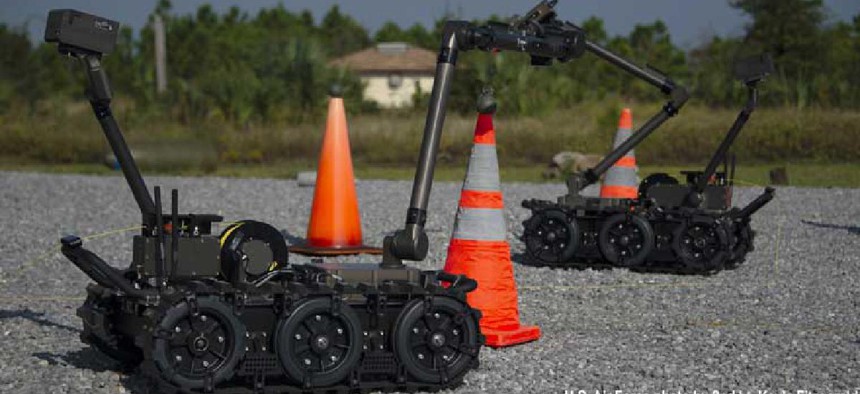AF rolls out bomb disposal robots


Connecting state and local government leaders
Air Force Civil Engineer Center will deliver 333 new robots and training to every explosive ordnance disposal flight across the Air Force.
Over the next 16-18 months, the Air Force Civil Engineer Center will deliver 333 new robots and training to every explosive ordnance disposal (EOD) flight across the Air Force, with each active-duty, Guard and Reserve flight receiving three to five devices.
The medium-size, remotely operated Man Transportable Robot System Increment II enables EOD units to detect, confirm, identify and dispose of unexploded ordnance and other hazards from a safe distance. It can also perform reconnaissance, classification, manipulation, route clearance, environmental sampling and other operations.
The first seven units went to Tyndall Air Force Base, which had its robot repair facility destroyed during Hurricane Michael in 2018.
The MTRS II replaces the decade-old Air Force Medium Sized Robot and provides a more intuitive and user-friendly experience. "The MTRS II controller is comparable to an Xbox or PlayStation-style controller – something the younger generation can pick up and immediately use with ease,” said Master Sgt. Justin Frewin, AFCEC EOD equipment program manager.
The new EOD robots also feature a more efficient camera and customizable software.
“Being able to update or rewrite the software means the Air Force can easily expand our capabilities down the road by adding tools, sensors and other attachments, whereas the old model required hardware updates,” Senior Airman Kaelob King said. “In our field, having a flexible, autonomous robot is a really good thing.”
“The biggest thing these new robots provide … is an enhanced force protection capability to protect people and resources from explosive-related incidents, enable air superiority and quickly resume airbase mission activities," said Chief Master Sgt. Van Hood, EOD career field manager. “The cameras, the controls, the communication systems – we're able to get a lot more into a smaller package and we’re able to be safer and more efficient.”
In addition to the $43 million MTRS II acquisition, the Air Force Civil Engineer Center also plans to complete a large robot acquisition in the coming months to replace the aging 485-pound Remotec F6A.
NEXT STORY: How will self-driving cars affect public health?




